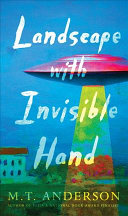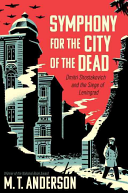Anderson, M.T.
3 Articles
Last 30 days
Last 6 months
Last 12 months
Last 24 months
Specific Dates
From:
To:
Landscape with Invisible Hand
 An engrossing, speculative look at life in the margins, this is a first purchase for libraries serving teens.
An engrossing, speculative look at life in the margins, this is a first purchase for libraries serving teens.
Yvain: The Knight of the Lion
An intriguing selection that will be most appealing to fans of high fantasy and Arthurian stories.
Symphony for the City of the Dead: Dmitri Shostakovich and the Siege of Leningrad
 A must-have title with broad crossover appeal—Luann Toth, School Library Journal
A must-have title with broad crossover appeal—Luann Toth, School Library JournalAccomplished novelist Anderson presents an ambitious work of nonfiction encompassing the life of composer Dmitri Shostakovich, the early political history of the U.S.S.R., and the nation’s horrific suffering during WWII. Initially inspired by the Bolshevik Revolution, Shostakovich’s music changed as he witnessed friends and family suffer torture, disappearance, and death during Stalin’s Reign of Terror. Alternately denounced and celebrated by Soviet authorities, Shostakovich lived in fear of the NKVD arriving at his door. The book’s centerpiece is his Leningrad Symphony, embraced by audiences and the authorities alike; the varied movements offered both catharsis and hope at the nation’s darkest hour. Was Shostakovich a Soviet propagandist or covert dissenter, telling truths through his music about Stalin’s atrocities against his own people? Anderson notes the challenge of researching a subject for whose life “even the basic facts…are often contested”; this uncertainty results in the sometimes distracting reliance on perhaps and supposedly. The densely packed account changes focus throughout, from poetic descriptions of the composer’s work to stark depictions of starvation in Leningrad and the disastrous effects of Stalin’s purges. Narrative momentum rises and falls unevenly as the story shifts; it’s a lot to process for readers, for whom most of the material will be new. An extensive selection of black-and-white photographs helps define the wide range of subjects and settings; meticulous scholarship is evident in the detailed source notes, bibliography, and the author’s note addressing the credibility of research material. “There are few composers whose music and whose own lives reflect so exactly the trials and triumphs of the nation,” Anderson writes
ALREADY A SUBSCRIBER? LOG IN
We are currently offering this content for free. Sign up now to activate your personal profile, where you can save articles for future viewing



